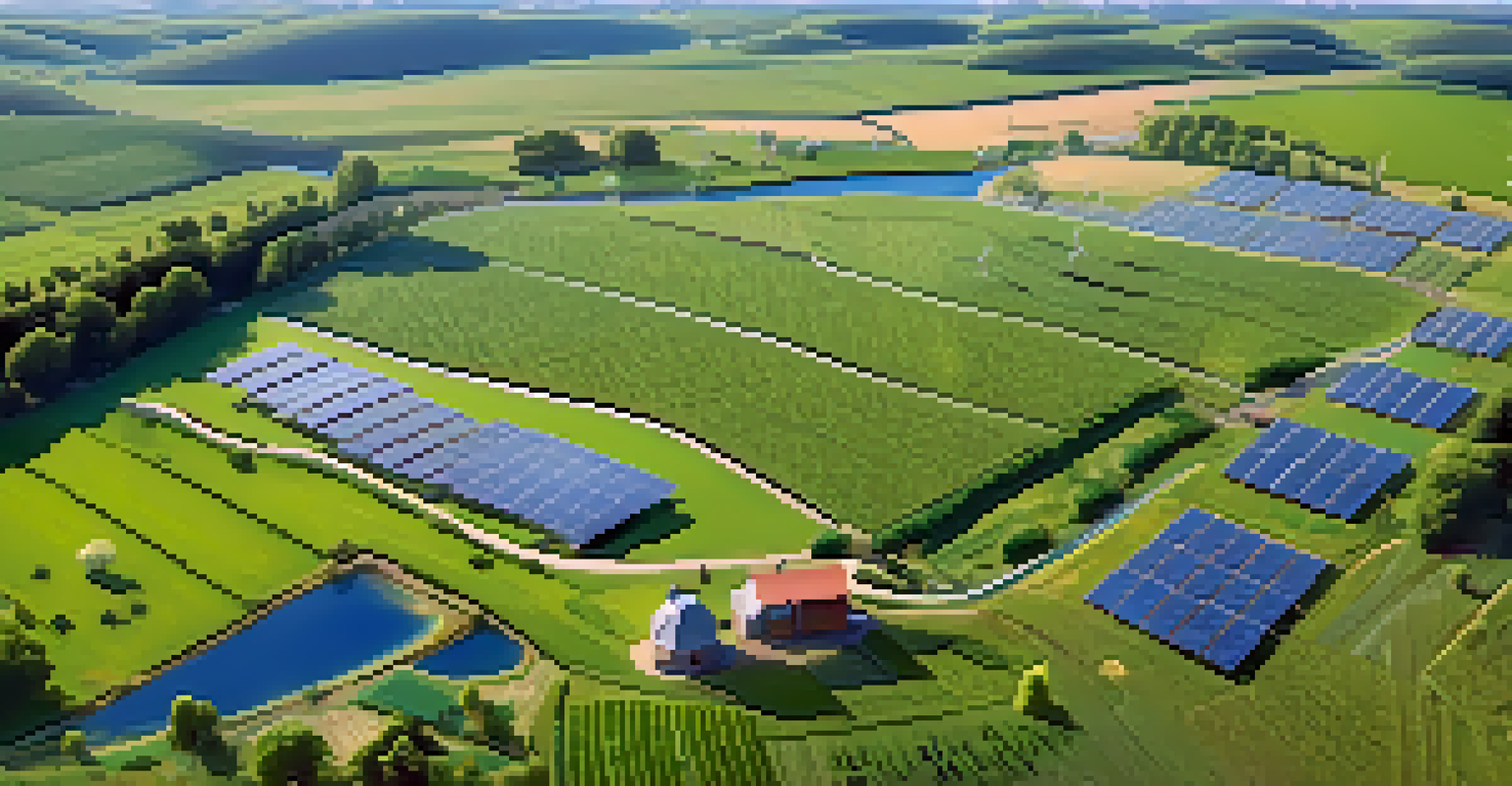The Intersection of Vegetarianism and Sustainable Agriculture Practices

Understanding Vegetarianism and Its Benefits
Vegetarianism is a lifestyle choice that excludes meat and sometimes other animal products. Many people adopt this diet for various reasons, including health, ethical considerations, and environmental concerns. By reducing meat consumption, vegetarians can contribute to lower greenhouse gas emissions, which is a significant aspect of climate change.
The food you eat can either be the safest and most powerful form of medicine or the slowest form of poison.
Health benefits of a vegetarian diet are well-documented, with studies showing lower risks of heart disease, obesity, and certain cancers. This lifestyle encourages the consumption of fruits, vegetables, grains, and legumes, all of which are rich in essential nutrients. Moreover, these foods are often lower in calories, making it easier for individuals to maintain a healthy weight.
Ethically, many vegetarians choose their diet to avoid the suffering of animals in factory farming. This moral stance aligns with increasing consumer demand for humane treatment of animals, which can lead to shifts in agricultural practices toward more sustainable methods. Overall, embracing vegetarianism can have a profound impact on personal health and the environment.
What Is Sustainable Agriculture?
Sustainable agriculture refers to farming practices that meet current food needs without compromising future generations' ability to meet their own. This approach focuses on maintaining ecological balance, preserving biodiversity, and promoting soil health. By using methods such as crop rotation and organic farming, sustainable agriculture aims to reduce environmental impact.

One of the key principles of sustainable agriculture is resource efficiency, where farmers maximize output while minimizing inputs like water and fertilizers. This not only helps in conserving natural resources but also reduces the carbon footprint of farming activities. Importantly, sustainable agriculture also emphasizes local food systems, which can bolster community economies.
Vegetarianism Benefits Health & Earth
Adopting a vegetarian diet can reduce health risks and environmental impact by promoting plant-based foods.
Moreover, sustainable agriculture supports the idea of regenerative practices, which actively restore and enhance the health of ecosystems. For example, integrating livestock into crop rotation can improve soil fertility and encourage biodiversity. By aligning agricultural practices with ecological principles, farmers can create a more resilient food system.
The Link Between Vegetarianism and Sustainability
The connection between vegetarianism and sustainable agriculture is increasingly recognized as vital for achieving food security. By consuming plant-based foods, vegetarians support agricultural practices that require fewer resources compared to meat production. This shift can lead to reduced deforestation, water usage, and greenhouse gas emissions.
Sustainable agriculture is a way of farming that maintains the health of the land and the people, balancing the needs of the present without compromising the future.
For instance, producing a pound of beef requires significantly more water and land than a pound of vegetables or grains. This stark contrast highlights how a vegetarian diet can alleviate pressure on the environment. As more people choose plant-based options, demand for sustainable agricultural practices grows.
Furthermore, vegetarianism encourages the cultivation of a diverse range of crops, which can enhance soil health and resilience. By supporting local farmers who practice sustainable methods, consumers can contribute to a system that is both environmentally friendly and economically viable. This synergy between diet and agriculture can yield benefits for both personal health and the planet.
Challenges in Adopting Sustainable Practices
Despite the clear advantages of sustainable agriculture and vegetarianism, several challenges hinder widespread adoption. One of the biggest obstacles is the existing reliance on industrial farming methods that prioritize high yields over ecological balance. This system often discourages farmers from transitioning to more sustainable practices due to perceived economic risks.
Additionally, there can be a lack of access to resources for small-scale farmers, who are crucial for implementing sustainable methods. Without proper support, these farmers may struggle to compete with large agricultural operations that dominate the market. This economic disparity makes it difficult for sustainable practices to flourish on a larger scale.
Sustainable Agriculture Supports Ecosystems
Sustainable agriculture practices enhance ecological balance and resource efficiency, benefiting both farmers and consumers.
Consumer awareness also plays a significant role in this equation. Many individuals may not fully understand the benefits of sustainable agriculture or vegetarianism. Education and outreach are essential to help bridge this gap, enabling consumers to make informed choices that support sustainable practices.
The Role of Policy in Promoting Sustainability
Government policies can significantly influence the adoption of sustainable agriculture practices. By providing incentives for farmers to implement eco-friendly methods, policymakers can encourage a shift towards sustainability. This includes grants, subsidies, and technical assistance that help farmers transition from conventional to sustainable practices.
Furthermore, policies aimed at promoting plant-based diets can enhance public health and environmental outcomes. Initiatives like school lunch programs that emphasize vegetarian options can introduce children to healthy eating habits while supporting sustainable agriculture. By integrating these practices into public policy, the benefits can be felt across communities.
Additionally, regulations that limit harmful agricultural practices, such as excessive pesticide use, can protect both the environment and human health. By creating a framework that supports sustainable agriculture, governments can foster a future where vegetarianism and eco-friendly farming coexist harmoniously.
Community Involvement in Sustainable Practices
Community engagement is a crucial aspect of promoting sustainable agriculture and vegetarianism. Local initiatives, such as community gardens and farmer's markets, empower individuals to connect with their food sources. These grassroots efforts can lead to a greater understanding of the benefits of sustainable food systems.
By participating in community-supported agriculture (CSA) programs, consumers can directly support local farmers who practice sustainable methods. This not only helps boost the local economy but also fosters a connection between consumers and their food. Such relationships can inspire more people to adopt vegetarian diets and advocate for sustainable practices.
Community Engagement Drives Change
Local initiatives and education foster community involvement in sustainable practices, encouraging more people to embrace vegetarianism.
Moreover, educational workshops and outreach programs can raise awareness about the importance of sustainability in agriculture. By sharing knowledge about growing food sustainably, communities can encourage individuals to embrace vegetarianism. This collective effort can create a more informed and engaged society committed to sustainable food practices.
Conclusion: The Future of Food Choices
The intersection of vegetarianism and sustainable agriculture presents a promising path toward a healthier planet. By prioritizing plant-based diets, individuals can contribute to reducing environmental degradation and promoting biodiversity. This choice not only benefits personal health but also supports the well-being of future generations.
As awareness of climate change and food security grows, more people are exploring vegetarianism and its potential impact on agriculture. By making informed choices, consumers can drive demand for sustainable practices and encourage farmers to adopt eco-friendly methods. This shift can lead to a more resilient food system that nourishes both people and the planet.

Ultimately, our food choices are powerful tools for change. By embracing vegetarianism and supporting sustainable agriculture, we can play a role in creating a more equitable and environmentally-friendly food landscape. Together, we can pave the way for a sustainable future, where our dietary choices contribute to the health of the earth.